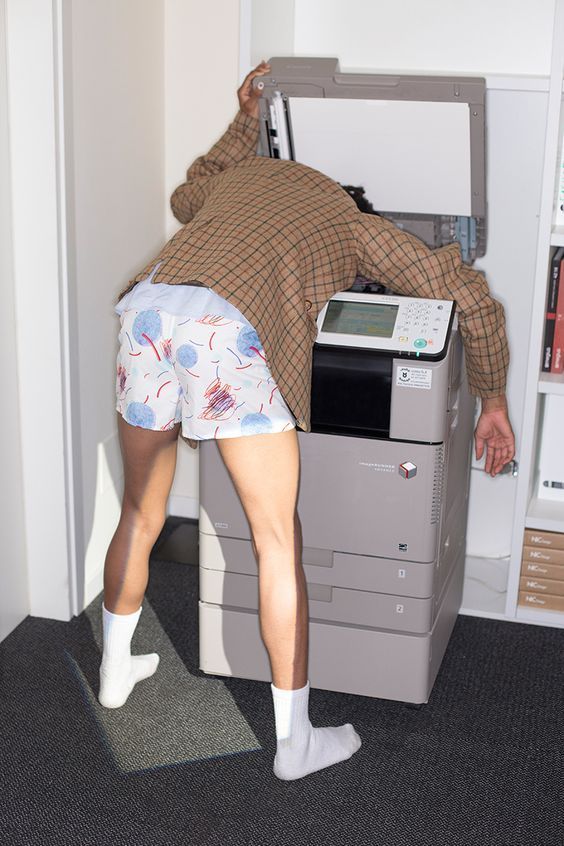.png)
.png)
Qualitative research data in this article was collected from a Koi Pond study run by NinetyEight. The Koi Pond is NinetyEight’s proprietary research community with over 1,600+ Gen Z participants. Learn more about The Koi Pond here.
Scrolling through news about Gen Z feels like a warzone: our generation is simultaneously unemployed and unhireable, yet still overly ambitious, cunning, and entitled at our jobs. It’s easy to ignore the errant sensational article, but when every major media publication is publishing articles like: “Gen Z wants in-office sex to be a totally acceptable thing” (Yes, this is a real FastCompany article) it’s hard to separate the truth from the myths.
Interestingly enough, these articles all seem to make the same mistake: addressing the reader as if Gen Z isn’t in the room already. Well, we’d hate to break it to you, but if you’ve hired anyone young in the past 8 years, chances are you’ve hired a Gen Z.
One of the most common Gen Z work narratives argues that the corporate system is outdated: we’d agree, and the same thing can be said for all this talk about Gen Z at work. It needs to be updated to account for Gen Zs’ real experiences, not just a hot take rant on Reddit or the latest viral TikTok on #corporate. Nuance has been sacrificed for the sake of views, but there’s a lot more value that can be drawn from a whole take. Instead of drawing from the extremes, we’d like to paint a different picture: one about the most average Gen Z worker.

Stocker. Cashier. Nanny. Receptionist. These are the real jobs that our Gen Zs currently hold. With the vast majority of Gen Zs starting their careers post-pandemic, the main goal of getting employed wasn’t to set on their professional journey, it was simply to survive. Combined with an economy that’s been “under threat of recession” for 5 years, and the ever-present “entry level” positions asking for 3 to 5 years of experience, it should come as no surprise then, that the most average Gen Z (39.3% of respondents) has job hopped twice already, moving to secure more favorable working conditions and maybe, actually, finally, putting their first foot forward on the career they had imagined for themselves.
“Service industry work has paid my bills during college, but it's not my lifelong passion.” “My dream career is to work in film and it took more time than I could manage while working in service as well.” “I went to school for art and it's my true passion.” are all common reasons that Gen Zs have cited for switching jobs. But to put it more bluntly, “better pay” (-Melissa 2000, Nat 1999, et al.) & “better future opportunities” (-Haven 2003, Mike 2001, et al.) are the most common reasons for job hopping. We’re not even taking the next step: we’re just putting on a shoe or unlocking the door. For Gen Z, career paths aren’t linear. In fact, we’re often shuffling around just to reach the starting point.
Regardless of the media narrative or how older generations feel, Gen Z is actually thriving in the workplace. The most average Gen Z has a great relationship with their bosses, while they feel at least somewhat connected to their coworkers as well. In fact, for 25% of our respondents, their coworkers/team is their favorite part about being on the job, making it by far the #1 reason cited, surpassing other benefits such as the flexibility (17.3%) and pay (3.8%) of the job.
Yet, despite the day-to-day joy Gen Zs feel for their workplace, only 6.7% of respondents felt extremely satisfied with their career trajectory. While Gen Zs may feel connected to their immediate team and boss, leadership and upper management are a different story. Izzy (1996) expressed frustration with the disconnect, saying, “I would love our managers to be more familiar with our work so they can make better plans. It’s frustrating to explain to someone who makes 4x my salary what my department does.” Alex (2002) says something similar about his workplace: “I'd change the assignment of responsibilities. I feel that operations managers are given too many unnecessary tasks that take away from spending time with associates/your team.” In spite of their frustrations, a clear theme rings true for Gen Z workers: their worries are always on completing the task at hand, in service of the company direction and goals.
Workplace drama, bureaucracy, and a toxically competitive work environment underscore the common gripes Gen Z has with their jobs, but one reason stands above all: the pay. Unsurprisingly, pay remains one of the biggest pain points for Gen Z, especially at their current stage in their careers. A little over 20% of our respondents cite pay as the absolute worst thing about their job, while 21% cite pay increases as the #1 thing they would change about their job.
Whether or not companies can and are willing to pay more, Gen Zs still need to make ends meet. Even though 39.7% of our respondents are partially employed, 50% of our respondents are working multiple jobs to pay the bills. This isn’t limited to part-timers or gig workers either: 38.3% of our full-time employed Gen Zs are working another job or side gig to just get by. This alone underlines how employment and work have changed just over the past 5 years. With the most average Gen Z still making under $30,000 a year, finding additional streams of income is essential for survival in 2025.
While the media still paints a grim narrative today, we’d like to offer a different perspective on Gen Z at work. Lazy? Tell that to the Gen Z working 3 jobs to stay afloat. Entitled? Tell that to the unpaid interns sticking it out in hope of landing a return offer. Disrespectful? Tell that to the Gen Z actively reaching out to connect with their older peers. Naive? Tell that to the Gen Zs who have relentlessly navigated the ever changing job market to become employed. Unprofessional? Perhaps the corporate traditions are creating unnecessary inefficiencies, redundancies, and restrictions for work. Uninspired? Maybe the most average Gen Z isn’t the workplace menace you’re imagining, they are just another tired soul, hesitant to join the rat race.

“We are not lazy, we are efficient and adopt a lot of new technological practices to enhance our work.” - Alex, 2002
“Even if it’s not the traditional approach, if you let us handle an assignment our way, we will get the job done and give you the requested results. In fact we’ll probably deliver even more if you allow us to approach things the way it works best for us.” - Cameron, 2001
“We’re human. Sorry we value our livelihoods more than you and aren’t willing to upend ourselves to find “coping mechanisms” to have a healthy work life balance. The balance should start with the company and systems that leadership put in place, not us.” - Ethan, 2001
“We care about the impact our work has on others and the impact it has on us. We want to be given opportunities to grow that may look completely different from the old ‘American Dream’, being able to afford a house in this economy is currently seen as a fanciful luxury. On our way to reaching our personal goals, if we can uplift others, we see no reason to needlessly step on ‘competition’. It's not two people fighting for a promotion, why not we both get promoted or focus on improving the system that encourages competition to reach a livable wage.” - JK, 2006
“We’re not so different, circumstances are. Young people now have a lot more on their plate because of globalization and the economy.” - Milo, 2005
